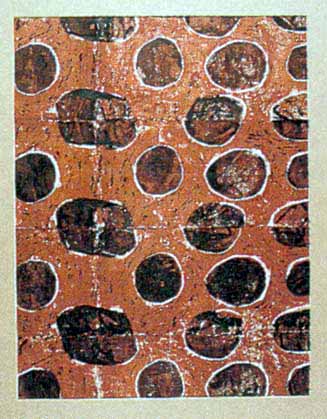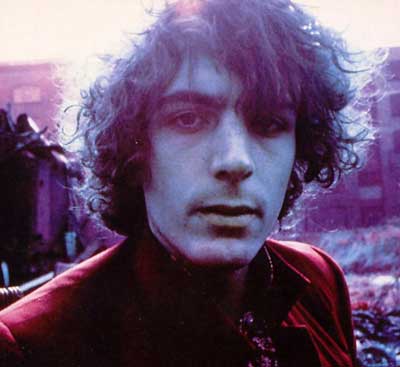The Psychology of the Hole

From figures as diverse as the fictional narrator of Haruki Murakami’s Wind Up Bird Chronicle (who contemplates his life for an unknown period from the bottom of a well) to physicist Stephen Hawking, whose increasing physical restriction does not seem to stop his contemplation of the vast holes in space - humanity relates to the notion of the hole in a fashion that often reveals much about how humanity now experiences itself as existing in the world…we are thrown as Heidegger stressed in Being and Time… perhaps, into a (w)hole of a world…who knows, but on the day that youthful luminary Syd Barrett finally left this life perhaps it is appropriate to ask - what is the nature of the whole? And more pertinently what might it be like to fall into one?
For Stephen Hawking the hundreds of millions of Black Holes in outer space, into which the raw materials of creation are perpetually leaking, manifest the information paradox – a conceptual hole in which the very possibility of science or philosophy ever grasping the nature of creation may be destroyed. Hypothetically, gaining the knowledge of the position or nature of every particle in existence would be the key to gaining magic like powers to mould creation – but as Black Holes appear to destroy this knowledge in their constant consumption of time and space it is unachievable.
That Hawking is imagining such potential is a remarkable illustration of the human capacity to rise beyond the limitation of the body into mind, or a realm of pure thought. Within this near heavenly realm of potential the Black Hole is like an apple carried by the snake…an apple of super dense gravity and destruction.
Leonard Susskind the eminent theoretical Physicist has postulated one solution to this information paradox, in which the information seemingly lost to the Black Hole is actually stretched/condensed from a 3D stream to a 2D stream somewhat like a living reality being placed into a roll of film – in this roll skewed along the Event Horizon of the Black Hole the seemingly lost information is actually stored in a new form. In this way information changes state, changes the way it is stored, rather than simply disappearing all together. Whilst Hawking and Susskind were at odds for a long period of time Hawkins recently and very publicly underwent a U-turn on his own paradox, stating in effect that because of seemingly infinite parallel universes some of which do not have Black Holes the information lost to Black Holes (in universes like ours which have them) will eventually be found again. It all sounds like science fiction, and indeed technically it is!
What interests me here from a psychological perspective is how the importance which man is placing on this dialogue with the vast hole, can be recognised as a metaphoric explosion of the smaller hole, the one we can fall into, both outside and inside ourselves. Within this more intimate notion of the hole we can sense the threat of non-being – what would it be like not to exist? When scientists search frantically for ways that the core data of this universe might not be lost to vast Black Holes in space (a super massive one right at the heart of our Galaxy) are they not also, perhaps, entering into a metaphysical speculation as to whether the information of our lives is worth something, or whether it all just disappears into the void of the past, of death?

Looked at from this perspective, the darkness of the hole represents all that the consciousness cannot assimilate, cannot comprehend and therefore fears in its alien and aphotic appearance. Is not the information paradox, in a sense, one man’s tortuous pathway to faith, asking can I reconcile my mind and my spirit to this universe? Can I be inspired (derived from spirit) from what I see? From this perspective - beautiful lost souls like Syd Barrett can be perceived as bodies that collapsed about the Black Holes at the core of their own identity, like outmoded solar systems slowly collapsing in on themselves. Is this life lost forever then? I say no, partly because he left some great tunes, partly because he is remembered by friends, band-mates and public (Wish You Were Here) but also because as the scientists are beginning to explore - energy changes state, it does not disappear. In this sense the subtle realms of life, the morphogenetic fields (the modern Elysian fields…) and the implicate order do not rescind this deal, life, they do not ask for the cards back. Every card we play in life, every thought-intention and every feeling-desire exists like a hand we have played in a vast swirl of meta-information, that which Ervin Laszlo in his book Science and the Akashic Field (Inner Traditions, 2004) calls the A-field, the primary field.
As we gaze into space we gaze into ourselves, our origins - both literally, because it is the ancient light that emanated from the early days of the universe that we perceive and metaphorically, through the lens with which we approach the stars. A recent article in The Sunday Times suggested that the images captured by the Hubble Telescope, in their visualization of the new frontier - are the contemporary equivalent of the work of Ansell Adams. To ignore their artistry (the colour schemes and visual enhancements) was, the piece argued, to evince a certain naivety about a so-called rigid demarcation between science and art. It is this rigid dualism that the Archetypal perspective I am outlining in these posts is seeking to overcome, for in essence all is art (creative, aesthetic) and all is science (observation, correlation) – this experience is multifaceted and deeply involving. In our involvement our thoughts, feelings and spirit matter to the world we are in and as we care about being in the world (the Heideggerean ‘soren’) so then are we able to experience the world in its concealed-ness (the Hole) and its unconcealed-ness (the Whole) and realize that both matter to us.
Mark Jones
IMAGES: Untitled by Syd Barrett (c.1965), Syd photograph (c.1967)



2 Comments:
Hawking, Professor Stephen Hawking
His website:
http://www.hawking.org.uk/
Nice meditation Mark - makes me think of the (I think) Sufi saying about gazing at the stars apparently above us and yet contemplating that they are actually within us - and that they also meet our gaze and desire to incarnate as we are - in a body, for if you can't find 'it' in your body, where else are you gonna look?
James - good to see the oil depletion protocol link up on Rubedo now too, nice move.
K
Post a Comment
<< Home